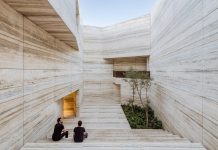The Beauty of Marble in Interiors and Facades

Michelangelo’s sculptures. The ancient Greek temples. Castle interiors and palaces. The iconic Barcelona Pavilion of Mies van der Rohe. When we approach the history of architecture and sculpture, it is inevitable that we speak of marble. Originating from a chemical reaction in limestone when exposed to high pressures and temperatures for thousands of years, this notable material is a metamorphic rock generally found in regions where volcanic activity has occurred. Its extraction, by itself, is already a spectacle.

The extraction process takes place in nature reserves in large rocky mountains and is executed by professional teams and equipment specific to the activity. The first piece of rock extracted is called a bench or board and is about 12 meters long x 6 m high x 1.80 wide. From it are cut out smaller blocks, approximately 3 m x 1.8 m x 1.8 m, which will later be sliced into smaller thicknesses for the manufacture of countertops, floors, cladding, and other objects. Although marble extraction leaves a significant environmental impact, almost everything extracted is eventually used used. Large parts are used for bigger, more expressive projects, while surplus pieces can be used in the formulation of paving blocks or for the manufacture of granilites and marmorites. Even marble powder can be used to increase the physical properties of structural blocks.



With its characteristic veins and many potential shades, including white, gray, pink, green, and black, marble continues to impress today and is used in civil construction for interior coverings, floors, benches and some facades. Its aesthetic prominence has gained such heights that some patterns of porcelain and other materials that seek to imitate the design of marble are quite popular.

There are 4 main types of finishes for marble:
Raw: The marble is just sawed off and left as the rock was removed from its deposit.

Polished: The most popular finish. By polishing the surface, the texture of the piece is replaced with a smooth appearance and gloss.

Tumbled: This is an intermediate finish, which gives an opaque and smooth appearance, maintaining the natural color of the rock.

Brushed: Consists of brushing with diamond abrasive brushes on the rock surface, leaving the surface slightly uneven with a slight satin shine.

Marble users should always apply a resin to the stone so that all porosities and natural imperfections can be covered.

It is very common for marble to be confused with granite, which is an igneous or magmatic rock and results from the consolidation of cooling molten magma. While marble has veins, granite sports a more grainy appearance. Another important difference is that marble is a more porous material, absorbing more moisture.
Because marble is a natural material, it is precisely its designs, colors, and patterns that make it so desired. Its price varies with the rarity and exclusivity of the colors.
Check out a selection of projects that use marble in different architectural elements.
Facades

Furnitures

Flooring

Kitchens

Bathrooms

Source: www.archdaily.com
The post The Beauty of Marble in Interiors and Facades appeared first on StoneNews.eu.
6:56 am January 31, 2020

Atieh Pasargad Amethyst International Trade Company ( سنگ پاسارگاد )
Address: Old Qom kashan Road – Omid Stone City – Qom – Iran
Email:
Ali Shafiei – CMO » Ali@pasargadstone.com
Hossein Shafiei – CEO » Hossein@pasargadstone.com
(+98) 912 553 5362
Ali Shafiei – CMO
Chief Marketing Officer
(+98) 912 251 8055
Hossein Shafiei – CEO
Chief Executive Officer
سنگ پاسارگاد – Pasargad Stone All Right Reserved
Designed and Developed by Branex.ir برانکس
